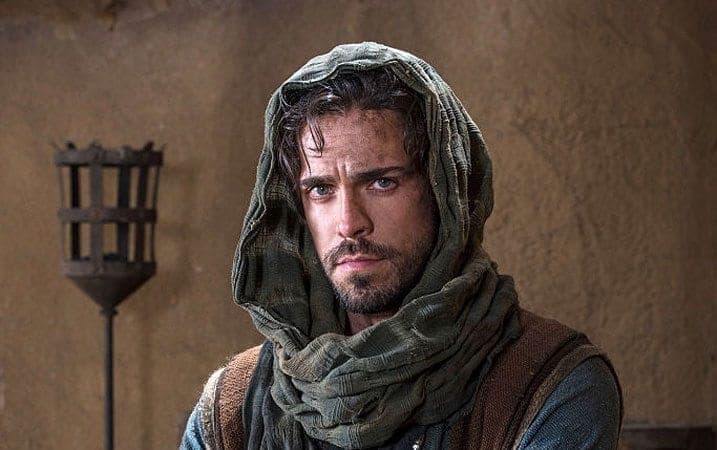David and Goliath is probably one of the most well-known stories from the Old Testament. As many of us learned in Sunday School, God helped David kill the Israelites’ giant foe by guiding one of five smooth stones from a slingshot straight to Goliath’s head.
But was the battle really that simple? Did the two engage in any fighting before that slingshot? Maybe David was able to tire out the giant first, making that infamous bullseye mark slightly less implausible. Or maybe he shot out Goliath’s knee first, which would’ve helped even more. Is that how he killed the lion?
These are some of the questions that “Of Kings and Prophets” plays with. Written by Adam Cooper and Bill Collage, the ABC drama, which premieres at 10 p.m. ET Tuesday, tells the biblical story of the complicated relationship between Israel’s first two kings, Saul and David, as told in the two books of Samuel.
When the series opens, King Saul (Ray Winstone) is struggling to unite the 12 tribes of Israel in order to strengthen their arm against the Philistines, their ancient enemies. He’s hopeful that an arranged marriage between his daughter Merav (Jeanine Mason) and a man from Judah’s tribe will help seal the deal. Meanwhile, the prophet Samuel (Mohammad Bakri) tells the King that God wants him to focus on killing another of his ancient enemies, the Amalekites. Saul disagrees with Samuel — which introduces a theme that often crops up in Jewish literature: King vs. Prophet.
While this is happening, a Bethlehem shepherd named David — played by charming newcomer Olly Rix — becomes increasingly agitated with a lion that’s killing his family’s sheep, making it impossible for them to pay the taxes they owe the king. David travels to Gibeah to strike a deal with Saul, but it’s Saul’s wife, Queen Ahinoam (Simone Kessel) that he barters with: David will kill the lion stalking his flock, and in exchange his family will be forgiven their debt. If he dies, says the queen, he will have learned his lesson. Ahinoam seems intrigued with the young shepherd; after he kills the lion, she brings him into her palace to play the harp for her war-weary husband, Saul.
The scope of the show is impressive: the rolling hills of South Africa stand in for the biblical battlefields of Gibeah, which host the bloody, elaborately-staged clashes between Israel and her enemies. The costumes are created with impeccable detail, and the sets don’t smack of the same kind of anachronism that plagues other made-for-TV Bible shows. All of this serves the ensemble well, who offer fresh, sexy takes on some of the Bible’s most well-known characters.
Well, maybe these characters are less known than known about. Some of the characters in the series are only mentioned briefly in Scriptures, and those that fill its pages — David is mentioned more than 1,000 times in the Bible — are often looked at as mythical names, not as humans caught in the throes of war.
I’ve seen a few reviews making much of the graphic sex and violence of the series. Okay, there is graphic sex and violence, but this is ABC — the most nudity and sex you’ll see are of the “NYPD Blue” variety, and the violence, while gory at times, won’t make you faint. The network has suggested offering less edited versions online, with longer, more explicit sex scenes; but even those (I saw one of them) are mild by today’s television standards.
But what’s troubling about the critics fainting over the sex and violence isn’t their prudishness — it’s that they seem to be completely unaware that the Bible stories themselves are full of bodies grinding together in passion and violence. So when adaptations like “Kings” comes along, audiences tend to compare them not to the actual source material, but to the versions of those stories they learned in their youth.
As a result of the Sunday-School-ification of the Bible, much of what the text is actually saying gets lost, as teachers and ministers attempt to summarize these incredibly nuanced stories in inspirational theological soundbites. David’s battle with Goliath becomes a metaphor for the victory of even God’s most insignificant followers. Saul’s unquestioning obedience to God becomes an exemplar for how good Jews and Christians should behave. Samuel’s communication with God shows us how we should constantly be in communication with the divine.
But the problem is, these stories aren’t easily summarized, and these characters are even harder to dissect. That’s why shows like “Kings” are ultimately good for biblical studies: They remind those who take these texts seriously that successful biblical interpretation needs to often be helped along by a healthy dose of historical imagination.
Take, for example, the relationship between Saul and Samuel. The show hasn’t yet explored their back story, but much of their interactions on the series are informed by their complex history. The prophet Samuel was the last ruling judge over the nation of Israel, but his sons weren’t good men. According to the Bible, they were nothing like their father, and “took bribes and perverted justice.” When Samuel, in his old age, appointed his sons to be judges over the Israelites, the people protested and demanded the prophet anoint a king to rule over them, “that we may be like other nations.” Samuel was livid, but God told him to grant the request, and so he reluctantly anointed Saul, and God’s spirit came over him.
The relationship of Samuel and Saul is tinged with growing resentment and distrust. Saul has a duty to lead his people to victory, and to exercise his discretion in so doing. But Samuel is the mouthpiece of God, and Saul is to obey him, even if Saul disagrees with what he says. In the pilot of “Kings,” Samuel tells the King to wipe out the Amalekites, and to kill every last one of them, including their children. Saul, a loving father himself, is painfully torn over his instructions, and ends up allowing the king to live (although this was more a political decision than a compassionate one). When Samuel hears of the news, he freaks out and tells Saul that he will appoint a new King of Israel — one that unhesitatingly obeys the voice of Elohim, God.
Several characters in the first few episodes question whether Samuel really hears God the way he claims. Maybe he just likes calling the shots, and he’s validating his calls with a divine seal of approval. That might not be palatable to some Christians, but think about it the other way around: Is it more palatable to believe that God actually told Samuel to commission the slaughter of thousands of children? “Kings” simultaneously explores the human and divine sides of the historical coin.
Some who look at the Bible as a holy book might take issue with these kinds of creative liberties. After all, fictional adaptations of Scripture aren’t sacred. But the thing to realize is that the Bible is itself a kind of adaptation of historical events. The Bible might be a collection of 66 books, but those books are based on many more primary sources and oral testimonies. The Books of Samuel themselves are composed from a variety of texts, including the alleged “Court History of David.”
Bible writers are storytellers — storytellers who want to persuade their readers of certain theological truths: namely, that God is in control of human history, and that he will never forsake the covenant he made with Israel. To persuade their readers of these truths, biblical writers used the conventions of their days to theologize historical narrative in such a way that Israel’s national identity was strengthened. None of this means the Bible isn’t inspired by God. It only means that our conception of inspiration should be elastic and generous enough to take into consideration the historical situations that gave rise to these texts.
“Kings” is a historically conscious re-imagining of an epic 3,000-year-old Bible story, one that is completely relevant today. Sure, we don’t live under the stars and ride horses and hunt lions and giants with slingshots, but we experience the same emotions explored in the Books of Samuel: jealousy, passion, betrayal, anger, zeal.
As modern as our world is, we’re not that different from the divided kingdom of 1,000 BCE: Politicians who claim to hear the voice of God. Parents who desperately want the best for their children. And the middle-class everyman caught somewhere in between.


















